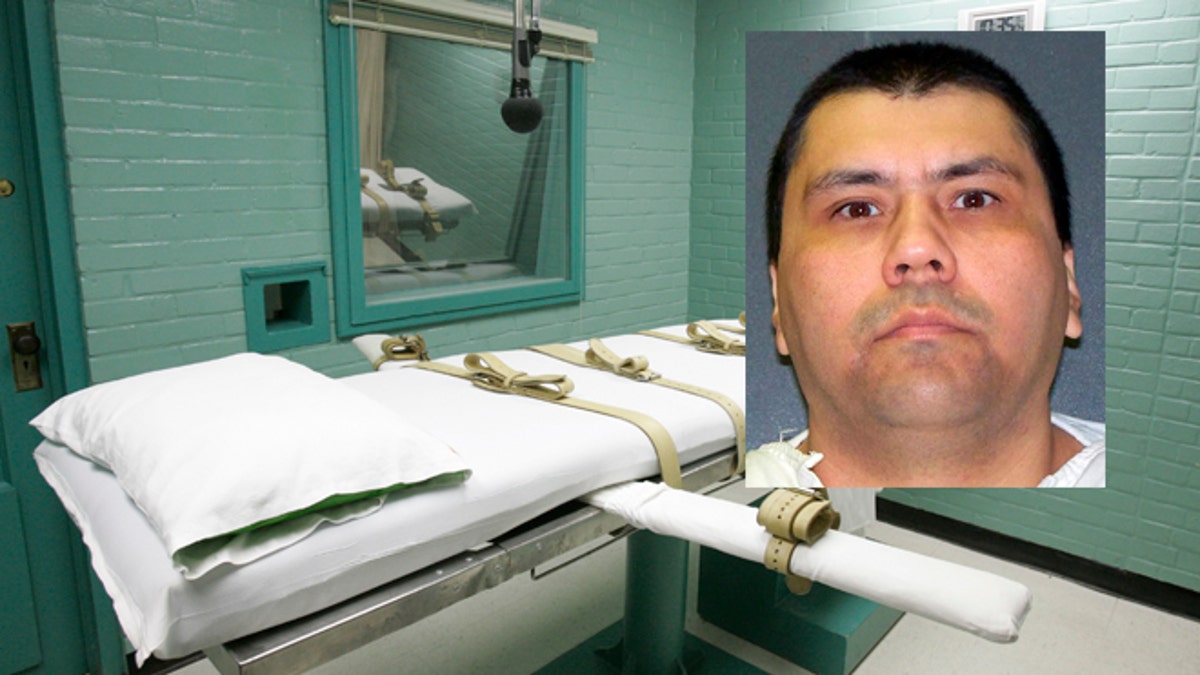
FILE - This May 27, 2008 file photo shows the gurney in Huntsville, Texas, where Texas' condemned are strapped down to receive a lethal dose of drugs. Texas prison officials say theyve secured a new supply of pentobarbital that will allow the nations most active death penalty state to continue executions. Texas Department of Criminal Justice spokesman Jason Clark also said the prison agency is not identifying the source of the new drug inventory because of threats made against previous suppliers when they were identified as a provider of lethal injection drugs. (AP Photo/Pat Sullivan, File)
HUNTSVILLE, Texas – Family members of a convicted killer on death row in Texas lost their last-day appeal to the U.S. Supreme Court to stop his punishment – and he was executed Wednesday evening.
The family of Jose Luis Villegas, 39, asked to court to spare him because he has an IQ of 59 and his mental impairment made him ineligible for the death penalty. The high court denied it several hours later, slightly delaying the punishment. Four of the nine justices indicated in the brief court order that they would have given him a reprieve.
Villegas was injected shortly before 7 p.m. CDT. Just as the pentobarbital began taking effect, he said, "It does kind of burn. Goodbye." He gasped several times, then started to breathe quietly. Within less than a minute, all movement had stopped.
Villegas was convicted of fatally stabbing his ex-girlfriend, her young son and her mother 13 years ago at a home in Corpus Christi.
"I would like to remind my children once again I love them," Villegas said when asked if he had a statement before being put to death. "Everything is OK. I love you all, and I love my children. I am at peace."
Villegas was pronounced dead at 7:04 p.m. CDT. He became the seventh prisoner executed this year in the nation's most active death penalty state.
Six relatives of his victims witnessed the execution but declined to comment afterward.
"I was struck by the calm and peacefulness inside that room as opposed to the utter terror the victims must have been in as Jose Luis Villegas stabbed them," Mark Skurka, the Nueces County district attorney who prosecuted Villegas, said after watching the execution.
"He made no attempt to make peace with the family, apologize to the family or show any remorse for taking the lives of three people," Skurka said. "The family expressed to me that they are glad that this is finally over and that justice has finally been done, even though it took a very long time in their minds for this to happen."
Villegas' lawyers filed a last-day appeal asking the Supreme Court to stop his punishment, saying testing in February showed he had an IQ of 59.
The Supreme Court has prohibited execution of mentally impaired people, although states have been allowed to devise procedures to make their own determinations. Courts also have embraced scientific studies that consider a 70 IQ a threshold for impairment, and the high court justices are reviewing a Florida law stipulating that number for death penalty eligibility.
The Texas Attorney General's office disputed the IQ finding, saying previous examinations of Villegas showed no mental impairment and the number cited in his appeal was based on testing after he received an execution date and had no incentive to do well on the test. State attorneys also argued his lawyers had 10 years to raise impairment claims but didn't do so until days before his scheduled punishment.
Villegas was convicted of fatally stabbing Erida Salazar, 23, her 3-year-old son, Jacob, and Salazar's mother, Alma Perez, 51, in January 2001. Their bodies were discovered by Salazar's father when he returned home after being excused from jury duty. Each had been stabbed at least 19 times.
Villegas, a former cook, dishwasher and laborer, was free on bond for a sexual assault charge and was supposed to go on trial the day of the killings for an incident in which a woman said he punched her in the face.
Police spotted Villegas driving Salazar's stolen car and he led them on a chase that ended with him on foot and urging officers to shoot him. When arresting him, police found three bags of cocaine in his baseball cap.
Following his conviction for capital murder, Villegas was convicted of two counts of indecency with a child related to the daughter of the woman he was accused of punching in the face prior to the slayings. Relatives have said Salazar's mother had urged her daughter to break up with Villegas when she learned of the sex charges against him.
Villegas also had convictions for making terroristic threats to kill women, burglary and possessing inhalants.
Attorneys argued the slayings were not intentional and Villegas was mentally ill. A defense psychiatrist testified Villegas experienced "intermittent explosive disorder," a condition that led to uncontrollable rages.
Villegas became the third Texas inmate executed with a new stock of pentobarbital from a provider corrections officials have refused to identify, citing the possibility of threats of violence against the supplier. The Supreme Court has upheld that stance.
Based on reporting by The Associated Press.
Follow us on twitter.com/foxnewslatino
Like us at facebook.com/foxnewslatino







































